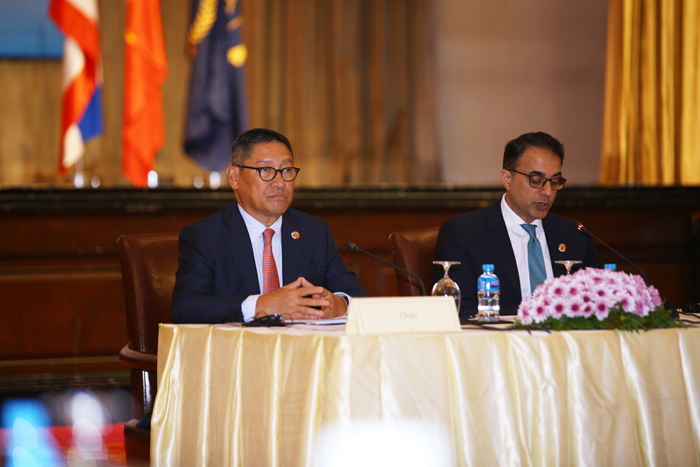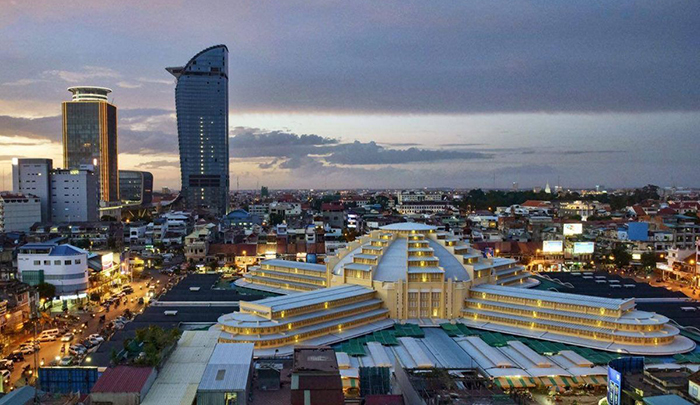Joint Statement from 23rd GMS Ministerial Conference
This is the joint statement issued at the 23rd GMS Ministerial Conference held in Phnom Penh, Cambodia on 18 November 2019.
Countries in the Greater Mekong Subregion are working together to promote the subregion as a single destination for international visitors and encourage communities to enhance the environmental, social, and economic benefits of tourism.
The Tourism Working Group (TWG) provides operational leadership and technical guidance to plan, implement, monitor, and evaluate subregional activities.
In September 2017, ministers from the six member countries of the Greater Mekong Subregion (GMS) endorsed the GMS Tourism Sector Strategy 2016-2025 to enable more competitive, balanced, and sustainable destination development. The Strategy sets out five strategic directions: (a) develop human resources, (b) improve tourism infrastructure, (c) enhance visitor experiences and services, (d) conduct creative marketing and promotion activities, and (e) facilitate regional travel.
Work of the GMS tourism working group has included marketing sustainable and pro-poor tourism in the subregion through the development of multi-country tour packages; training government officials and people working in the tourism industry; producing local products for sale to tourists; and preserving the ecological and cultural heritage of key tourist sites in the subregion.
The GMS Economic Cooperation Program Strategic Framework 2030 (GMS-2030) builds on the current Tourism Strategy directions. Since the subregion’s tourism industry has been severely impacted, the GMS-2030 will promote recovery efforts, such as intraregional tourism. Over the long term, GMS-2030 will support the development of higher value-added and secondary destinations, as well as strengthen human capital, connectivity infrastructure, public–private linkages, and environmental sustainability. GMS-2030 was endorsed and adopted at the 7th GMS Summit of Leaders in September 2021. It aims to provide a new setting for the development of this subregion for the next decade.
Related
• Greater Mekong Subregion Tourism Sector Strategy 2016-2025
• Mekong Tourism Coordinating Office website
Focal Persons at the Asian Development Bank
Steven Schipani
Water and Urban Development Sector Office
Sectors Group
Dee Suvimol Thanasarakij (Ms.)
Executive Director,
Mekong Tourism Coordinating Office
www.mekongtourism.org
Other Concerned Staff & Consultants
Asadullah Sumbal
Regional Cooperation and Integration Unit
Southeast Asia Department
Alma Canarejo
Regional Cooperation and Integration Unit
Southeast Asia Department/GMS Secretariat
Send inquiries to GMS Secretariat.
This is the joint statement issued at the 23rd GMS Ministerial Conference held in Phnom Penh, Cambodia on 18 November 2019.
The 44th Greater Mekong Subregion (GMS) Tourism Working Group Meeting, held on 28-29 November 2019 in Siem Reap, Cambodia, was attended by more than 70 senior tourism officials and development partners. Delegations included national tourism organizations of the GMS countries, the Asian Development Bank (ADB), the ASEAN-China Center, the ASEAN-Korea Center, the ASEAN-Japan Center, Luxembourg Development, Pacific Asia Travel Association, and Mekong Institute.
Viet Nam’s Lao Cai province has become a ‘promising destination for foreign investments,’ according to a feature on the Viet Nam Briefing, with its strategic location on the Greater Mekong Subregion (GMS) Northern Economic Corridor and its connectivity to the southwestern region of the People’s Republic of China (PRC). Key sectors of investment in Lao Cai include construction, tourism, and a
Together We Deliver: Grants for a Brighter Future is a special edition of the Asian Development Bank’s (ADB) annual publication featuring stories of lives uplifted across Asia and the Pacific through grant financing by the Asian Development Fund (ADF). The ADF provides grants to support activities that reduce poverty and improve the quality of life in “ADF countries”—the poorest and most vulnerable countries in the region.

Seated from left: Mr. Sok Chenda Sophea, Minister attached to the Prime Minister, Minister in charge of GMS Cooperation Program/GMS Minister, Secretary General, Council for the Development of Cambodia, and Mr. Ahmed M. Saeed, Vice President for ADB Operations in the Southeast Asia Department, the East Asia Department, and the Pacific Department at the 23rd GMS Ministerial Conference. Photo by ADB.
The Asian Development Bank (ADB) remains committed to supporting the future initiatives of the Greater Mekong Subregion (GMS) Program. Mr. Ahmed M. Saeed, Vice President of ADB, reaffirmed ADB’s support in his speech at the recently-concluded 23rd GMS Ministerial Conference (MC-23). The MC-23 was Mr.

Heads of GMS country delegations participate in the 23rd GMS Ministerial Conference. Standing from left are Mr. Vu Dai Thang, Deputy Minister, Ministry of Planning and Investment, Viet Nam; Mr. Aung Htoo, Deputy Minister, Ministry of Commerce, Myanmar; Ms. Cheng Lihua, Vice Minister, Ministry of Finance, PRC; Mr. Sok Chenda Sophea, Minister attached to the Prime Minister, Minister in charge of GMS Cooperation Program/GMS Minister, Secretary General, Council for the Development of Cambodia; Mr. Viengsavath Siphandone, Deputy Minister, Ministry of Public Works and Transport, Lao PDR; Mr. Thaworn Senneam, Deputy Minister, Ministry of Transport, Thailand; and Mr. Ahmed M. Saeed, Vice President for ADB Operations in the Southeast Asia Department, the East Asia Department, and the Pacific Department. Photo by ADB.
The Royal Government of Cambodia and the Asian Development Bank (ADB) organized the 23rd GMS Ministerial Conference on 17-18 November 2019 in Phnom Penh, Cambodia, with the theme “Greater Integration, Inclusivity and Sustainability in the GMS.” The meeting brought together GMS Ministers and Senior Officials of the six GMS countries—Cambodia, the People’s Republic of China (PRC), Lao People’s Democrati
Through the ‘Made in Mon’ branding of local handicraft, women and the poor in Southeastern Myanmar are getting gainful employment opportunities.
ADB through a grant from the Japan Fund for Poverty Reduction initiated the project by upgrading handicraft production and processing facilities, providing design, manufacturing and marketing advice.
Risk communication is a critical component of countries’ effective response to health emergencies. This is why it is one of the focus areas of the Asia Pacific Strategy for Emerging Diseases (APSED), the common strategic framework for World Health Organization member countries of the Asia Pacific region to effectively detect, prepare for, and respond to threats posed by emerging infectious diseases. Risk communication helps inform decision making, encourage positive behavior change, and maintain public trust.

Phnom Penh skyline reflecting the city's rapid growth. The Central Market, built in 1937, is seen in the foreground. Photo by Lor Teng Huy - own work, CC BY-SA 4.0
The Ministers of the six member countries of the Greater Mekong Subregion (GMS) are set to lay the groundwork for the preparation for the 7th GMS Summit of Leaders.
Hosted by the Royal Government of Cambodia and the Asian Development Bank (ADB), the 23rd GMS Ministerial Conference (MC-23) will take place in Phnom Penh on 18 November 2019, with the theme "Greater Integration, Inclusivity and Sustainability in the GMS.”
Thailand’s Golf Digg and Viet Nam’s Spa Noir emerged as winners in the Mekong Innovative Startups in Tourism (MIST) 2019. Golf Digg, an online golf booking service, won as best Travel Technology Venture.